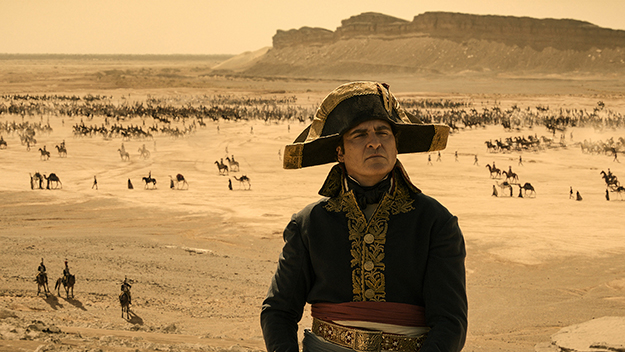Tiny King
This article appeared in the November 22, 2023 edition of The Film Comment Letter, our free weekly newsletter featuring original film criticism and writing. Sign up for the Letter here.

Napoleon (Ridley Scott, 2023)
More than a republican or a royalist, Napoleon Bonaparte was—forgive me—a disruptor. “World history on horseback” is how Hegel described the general-turned–self-crowned emperor, and accordingly, his story has long triggered film directors’ aspirations to technological innovation and heroic vision—from the unprecedented technique of Abel Gance’s Napoleon (1927), perhaps the most euphoric expression of silent cinema’s world-remaking potential, to Sergei Bondarchuk’s Soviet-era Waterloo (1970), with its mass mobilization of real-life soldiers as extras, to Stanley Kubrick’s notoriously unrealized epic biopic.
Ridley Scott was once also a filmmaker whose name signified the advance of history. An art school–trained prodigy who was one of the advertising industry’s original “creatives,” he carried the new-media sizzle of his commercial work into the sci-fi landmarks Alien (1979) and Blade Runner (1982). These days he cuts a more retrograde figure as a prolific craftsman, equal parts stodgy and stalwart, as likely to inspire shrugs (e.g., 2021’s House of Gucci) as rueful proclamations that We Used to Make Things in This Country (e.g., 2021’s The Last Duel). Arriving on the heels of Oppenheimer, Christopher Nolan’s middlebrow crowd-pleaser that some saw as deliverance for moviegoers jaded by corporate IP, Napoleon, too, suggests revanchist ambitions. Just as Napoleon himself led France out of post-Revolutionary chaos by setting its politics back to Roman times, Sir Ridley, both agent of change and rear guard, rides in to clean out the Thanksgiving box office with another Great Man of History biopic. Napoleon, however, is weirder than it initially appears—though it’s hard to tell if that’s Scott’s doing or that of his star. As Bonaparte, Joaquin Phoenix (once the shifty antagonist to a red-blooded Russell Crowe in Scott’s 2000 epic Gladiator), squirms and grimaces as if he’s allergic to the fabric of his costume, projecting a tactile discomfort with the weight of history and the expectations of genre.
In some ways, Scott returns to where it all began. In his first feature, The Duellists (1977), set during the Napoleonic Wars, Harvey Keitel played a Brooklyn-accented Hussar whose inexplicable grudge against a fellow officer, played by the much taller and easygoing Keith Carradine, stood in for the upstart provocations of Bonaparte himself. This thumbnail understanding of Napoleon as a thin-skinned bantamweight shit-stirrer has not meaningfully deepened in the nearly half a century since. To Scott, Napoleon’s rise from lowly artillery lieutenant to brigadier general in the First Republic, his military triumph and failure, and his exile, return, and banishment all amount to the odyssey of an insecure social climber. His Napoleon is Trumpian in his grandiose reliance on alternative facts and desperate performances for a captive audience—not to mention his resentment of the much taller Duke of Wellington, played by the posh and contemptuous Rupert Everett.
Scott’s flagrant disregard for the historical record is evident right from the film’s first scene, in which he places Napoleon at the beheading of Marie Antoinette. His advertorial eye yields a rendering of the French Revolution that is at once experientially vivid and politically vague, in the way that A Tale of Two Cities was: we see the terror of a rageful mob; cast a sentimental gaze upon the brave, doomed queen as she’s led up the stairs to the guillotine; and witness the grimy details of the rotten veg chucked at her regal person. Even more than most decades-spanning completist historical dramas, Napoleon demands a high tolerance for scenes that play out like laughably compressed dramatizations of Wikipedia entries. (Scott recently explained a scene of Napoleon’s army firing cannons directly into the Pyramids as “it was a fast way of saying he took Egypt.”)
As Scott hopscotches from battle set piece to battle set piece—many of Napoleon’s major engagements took place at night or in bad weather, allowing Scott to mask CGI with diegetic darkness and monochrome color-grading—David Scarpa’s script reduces the arc of European history to Napoleon’s personal whims, and those whims are entirely motivated by his possessive passion for Joséphine (Vanessa Kirby). Like the myth of his diminutive stature—at five foot six and a half, he was only an inch and a half shorter than Joaquin Phoenix—well-worn stories of Joséphine’s affairs paint Napoleon as a little engine powered by grievance; such hoary clichés are also a convenient shortcut for filmmakers eager to consolidate, say, the imperial power struggles of 19th-century Europe into matters of individual will. Scott gets us to Egypt via a match cut from a close-up of Kirby’s impassive face to a long shot of the Great Sphinx of Giza, and has Napoleon abandoning the campaign after word reaches him of his cuckolding. The one-to-one association of empress and empire is made blindingly explicit when newspaper coverage (which recurs in the film as an expository device) of Joséphine’s affairs inspires Napoleon’s return from Elba.
Scott expends seemingly zero effort in shaping a unified performance style, an indifference that is especially noteworthy in the dialect free-for-all of his historical films. They can be hijacked easily by a rogue performer, such as Ben Affleck in The Last Duel or Jared Leto in House of Gucci. In Napoleon, it is hard to tell where Scarpa’s psychosexual simplifications end and Phoenix’s inventions begin, but the actor is eccentric far beyond the bounds of the role (with the imperious Kirby an ideal foil). With Joséphine, Napoleon is cravenly horny, humming like a little kid and pawing at the ground like a bull. But when the emperor drops his bicorn hat, he playfully places it on Joséphine’s head—shades of Brando unconsciously putting on Eva Marie Saint’s glove in On the Waterfront (1954), but signifying, instead of a buried feminine vulnerability, a desire to be dominated.
Phoenix, speaking in his natural accent and offbeat rhythms, is notably contemporary in his affect. His Napoleon is prone to tantrums, poor posture, goofy double takes, and self-soothing mumblings. Even the way he rings Joséphine’s doorbell, then turns to face the street and fiddle faux-casually with his sword, feels modern. He is pained and bored while giving battlefield orders, and in formal situations he seems like a schoolboy reciting catechism by rote, getting the inflections wrong because he doesn’t understand the meaning of the words. Seizing on the script’s frequently anachronistic or otherwise campy dialogue (“Destiny has brought me this lamb chop”), Phoenix gives a deliriously funny performance of arrested development to rival his turn earlier this year in Beau Is Afraid. It’s weak historiography, but a perversely entertaining portrait of pathology.
Mark Asch is the author of Close-Ups: New York Movies (2019) and a contributor to Reverse Shot, Sight and Sound, the Criterion Collection, and other publications.







